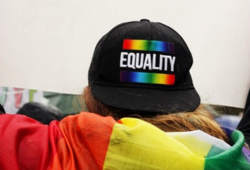
Health
Studies
Research
Group
The PRIDE Project
Promoting ResIlience And Wellbeing Through Co-DEsign (PRIDE): The Pride Rainbow Toolkit Project
Project introduction and background
 Despite rapid social progress, adolescents who are lesbian, gay, bisexual, transgender/trans, and queer (LGBTQ+ for brevity) often experience on-going bullying and victimization. This mistreatment can negatively impact on their mental and physical health. A pressing mental health challenge is addressing the adverse effects of the social violence many LGBTQ+ adolescents experience on a day-to-day basis.
Despite rapid social progress, adolescents who are lesbian, gay, bisexual, transgender/trans, and queer (LGBTQ+ for brevity) often experience on-going bullying and victimization. This mistreatment can negatively impact on their mental and physical health. A pressing mental health challenge is addressing the adverse effects of the social violence many LGBTQ+ adolescents experience on a day-to-day basis.
Typically, adolescents cannot simply leave harmful social environments due to the practical constraints around their schooling and their economic dependence on others. Many LGBTQ+ adolescents are geographically isolated away from LGBTQ+ charities or support groups clustered in large urban areas, and most will not have parents who are LGBTQ+. Further adding to the challenges is that LGBTQ+ adolescents are thought to be ‘coming out’ earlier; as a result, they frequently have not yet had time to develop the more sophisticated social and emotional skills of LGBTQ+ people who come out as young adults. Hence, there is an urgent need for widely accessible and targeted help to assist these adolescents to develop the best possible skills to thrive.
LGBTQ+ adolescents are an under-served population and few research-informed interventions have been developed for them. Coping strategies that are evidence-based for the general population but are fine-tuned with LGBTQ+ adolescents in mind (e.g. with strategies that assist them to manage LGBTQ+ related victimisation) offers considerable potential. This is especially so if they are delivered online in an engaging manner and focus on enhancing coping skills and building resilience.
What we have done...…
- To co-design a media rich “online rainbow wellbeing” toolkit with LGBTQ+ adolescents (called Oneself), and experts in psycho-social coping strategies as well as public health leaders (e.g. commissioners of services, experts on bullying prevention, therapists and police, teachers and youth workers);
- To explore how the online toolkit can be used within UK public health systems by LGBTQ+ youth themselves, and by community organisations and professionals who would benefit from using the online toolkit (e.g. as continuing professional development/CPD); and,
- To plan the delivery of the intervention and determine the design and measures for a future effectiveness study as well as further implementation of the toolkit.
Example content
Project outputs

The project has helped to fill a gap in the research literature regarding the cognitive and behavioural coping strategies that can enhance resilience for LGBTQ+ youth. Therefore, the project can benefit researchers as well as public health leaders. We expect that the findings will both inform the existing debate about this subject and contribute to the development of future interventions (in addition to the online toolkit/Oneself). Outputs have included:
- Presentations at conferences and meetings for researchers and those supporting LGBTQ+ adolescents in the UK and internationally, for example a paper at the International Society for Research on Internet Interventions (ISRII) in 2024; and,
- Publication of academic papers which will be added to open access repositories – three such papers have already been written, specifically: Promoting Resilience and Well-being Through Co-design (The PRIDE Project): Protocol for the Development and Preliminary Evaluation of a Prototype Resilience-Based Intervention for Sexual and Gender Minority Youth (in JMIR Research Protocols), Coping Strategies to Enhance the Mental Wellbeing of Sexual and Gender Minority Youths: A Scoping Review (International Journal of Environmental Research and Public Health) and A Web-Based Intervention to Support the Mental Well-Being of Sexual and Gender Minority Young People: Mixed Methods Co-Design of Oneself (JMIR Formative Research).
The team
Principal investigator: Dr Mathijs Lucassen (formerly at The Open University and now at City St. George’s, University of London) mat.lucassen@city.ac.uk
Co-investigators: Professor Louise Wallace (The Open University), Dr Rajvinder Samra (The Open University), Professor Katherine Brown (University of Hertfordshire), and Professor Katharine Rimes (King’s College London).
Academic advisors: Professor Elizabeth McDermott (Birmingham University) and the youth e-therapy research team (Professor Sally Merry, Associate Professor Terry Fleming, Dr. Karolina Stasiak, and Associate Professor Matt Shepherd) in New Zealand.
Project co-ordinator: Dr Alicia Nunez-Garcia (formerly The Open University now at University of Edinburgh).
Organisational partners: We have been supported by a range of partners including Hertfordshire and Oxfordshire County Council, Oxfordshire Clinical Commissioning Group, the Centre for Policing Research and Learning (Open University), Free2B Alliance, and Metro LGBTQ+ charity.
Stakeholder involvement: The project involves working with LGBTQ+ organisations, commissioners, and third sector service providers. We have advisors which oversee the execution of the research (e.g., LGBTQ+ adolescent advisors, our university-based academic advisors, service providers and others).
This briefing summary describes independent research funded by the Medical Research Council/MRC (under its Public Health Intervention Development/PHIND Programme). The views expressed are those of the authors, and not necessarily those of the MRC.
Contact us
Dr Philippa Waterhouse
philippa.waterhouse@open.ac.uk
Prof Sarah Vicary
sarah.vicary@open.ac.uk